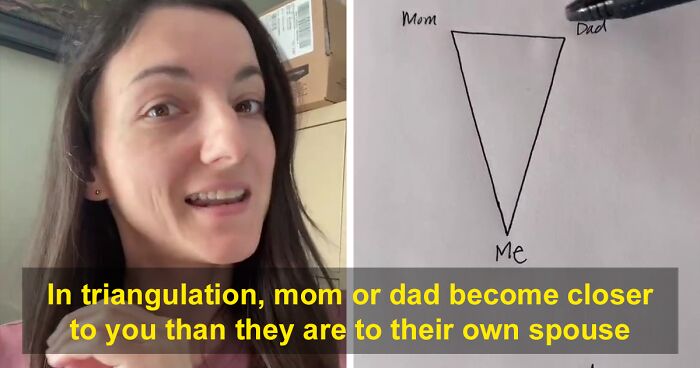
Marriage Mentor Illustrates What Happens When Parents Have Stronger Emotional Bonds With Kids Than With Spouses
InterviewHumans may be one of the most advanced species on this planet, but it surely comes back to bite us on the rump when it comes to relationships because, well, it’s hard, man, and we ain’t making things any easier.
Marriage mentor Suzy Sypert, with whom Bored Panda got in touch for an interview, has recently been going viral for explaining just how much relationships can get problematic in a family depending on how close parents are with their kids.
In the now-viral TikTok video, Sypert elaborates on the Family of Origin Triangulation phenomenon, whereby one parent or step-parent can grow to hate a kid because of how close they grow to the other parent.
More Info: TikTok Part 1 | TikTok Part 2 | Instagram | Website
While TikTok is primarily an entertainment social medium, it’s quickly becoming an educational one too
Image credits: Suzy Sypert
Huge disclaimer by Suzy Sypert: “first, only a licensed therapist hired by someone can truly diagnose the issues in their lives that need to be addressed. I’m here to educate and draw attention to things that happen to people as they’re growing up.”
“Second, how this plays out for people and what they need to do to heal is as varied as the families that we grow up in, and again, is why people need to do their own work and find a therapist that can help them look at their specific situations.”
“I am deeply indebted to Adam Young Counseling and his podcast ‘The Place We Find Ourselves,’ as well as, The Allender Center of Dan Allender for all the things they have helped me learn and understand on this topic and other issues of attachment theory.”
And now, on with our article!
And what started off as a mother-in-law improv quickly turned into an educational video on the Family of Origin Triangulation
Image credits: Suzy Sypert
So, TikToker Julianna Jenning posted a video where she improvised toxic MILs. One of the phrases she used was “you’re his wife, but I’m his mother, and I raised him!”
Well, marriage mentor Suzy Sypert stitched that for her own TikTok video and used the opportunity to explain this thing called the Family of Origin Triangulation.
Image credits: Suzy Sypert
Basically, in a healthy family, the parents would have a closer emotional relationship between each other than they would with their children. This, of course, doesn’t mean the kid isn’t loved—just that the parents share a more intimate bond between each other than with the child, who is loved nonetheless.
If all of this sounds all too familiar, Sypert explains that this is a pretty common occurrence: “F.O.T. is much more common than people want to admit. We even have terms that are sometimes used for it: ‘Mamma’s boy’ or ‘Daddy’s girl.'”
Image credits: Suzy Sypert
Image credits: Suzy Sypert
Image credits: Suzy Sypert
Now, it can happen that one of the parents could develop an emotional relationship that is closer to their kid than to their spouse. As a result, the child starts meeting the emotional needs of the parent, and they inevitably start carrying the burden, while the spouse starts developing disdain for the child.
This can happen with any variation: between the mother and her son or daughter, as well as the father and his son or daughter.
Image credits: Suzy Sypert
Image credits: Suzy Sypert
Image credits: Suzy Sypert
Here’s part one of Suzy’s explanation on the family of origin triangulation
@suzysypert##stitch with @itsjuliannajennings where do the ##milfromhell come from? It could be that Family of Origin Triangulation ##friendsreunion2021♬ original sound – Suzy Sypert
In part two of her video, Sypert elaborates on how this can also happen between biological parents and their kids when a step-parent is in the mix. So, for example, a mother can be closer to her son than she is to her boyfriend.
Sypert released a ‘part two’, where she answers a TikTok user’s question
Image credits: Suzy Sypert
This ultimately boils down to immense pressure for the child. They are now effectively functioning as the spouse on an emotional level. It doesn’t allow the child to be a child and enjoy childhood, and this is besides being emotionally burdened by the parent’s emotions and the whole thing being very damaging.
Told you relationships are hard.
And that’s not all. Sypert elaborated that it can affect people’s marriages and abilities to relate to their spouse and others and it can affect people’s sexuality and how they pursue connections with others.
“This is happening during a person’s most formative years—childhood—and continues into adulthood where the child continues to serve the role they did as a kid. In short, it can affect every part of our life. How we love. How we see ourselves. How we see others. How we parent,” explained Sypert.
Image credits: Suzy Sypert
Image credits: Suzy Sypert
While so far there is just one video out answering people’s questions, Sypert plans to release more videos and to elaborate on the topic of Family of Order Triangulation.
“I would like to cover some of the negative impacts on adults who were triangulated as children, perhaps some red flags that ‘if you felt this way or that’ you may have been triangulated, some good resources to go to to start the healing journey, what sibling relations may have felt like if you were triangulated, maybe sharing some stories that give examples of what triangulation looks and feels like, explaining the difference between loving your kids and triangulation, and how triangulation plays out in marriages,” said Sypert.
Image credits: Suzy Sypert
Image credits: Suzy Sypert
So, Sypert comes out with what is now part one of this video, and it blows up on TikTok. As of the moment of this article, the video has garnered over 2.4 million views with over 436,000 likes, over 23,000 shares and thousands of comments, asking further questions and whatnot.
“I was really shocked that the video went viral. I only had a few hundred followers when it went viral, but I am so glad it did because it just reaffirms the fact that this is much more common and culturally accepted than we realize.”
“The most common and detrimental phrase I hear is, ‘my parents did the best they could.’ We have to be willing to appreciate all the good our parents did for us, while admitting the harm that also took place. That’s the bridge where healing can happen,” concluded Sypert.
You can check out the full part two video below
@suzysypertReply to @aspen.roseandco part 3, 4…to follow ##milfromhell##familydrama##answeringquestions♬ original sound – Suzy Sypert
There are plans for more videos on the topic, so be sure to follow Sypert on her TikTok channel. But before you go, tell us your thoughts on this in the comment section below!
114Kviews
Share on FacebookExplore more of these tags
I've previously heard the term "emotional incest". A parent uses a child for their emotional needs. One case I've known: a mother (married to the father) started confiding in and venting to her daughter from the time the daughter was 11. The girl felt guilty that she couldn't solve her mother's problems. It's such a breach of boundaries to turn one's child into one's confidante.
So when talking to your children, explain the situation, but rely on a spouse/close friend for emotional needs.
Load More Replies...Hmm, as the child of a single mother with dad only in the picture on weekends, I think there is a larger spectrum than just these two options. I was definitely closer to my mother than other kids my age who had both parents at home, but I don't feel she used me as her emotional trash bin. I also know a friend where I feel both parents totally overfocused on him beyond childhood in a way he eventually found suffocating. Still, very interesting food for thought!
I think that just means you just didn't see your mom's third point of support - her emotional support point not being your dad anymore, she may have utilized another family member or friend(s). I also only saw my dad a few times a year and so was closer to my mom, but my mom was very intentional not to turn me into her support system. I was very loved, but allowed to still be a child.
Load More Replies...Read up on triangulation dynamics in psychology. Any group of three will have two go against one, is the general idea of it. And it will apply to "groups" within a larger group. For example, mom-family vs dad-family vs the kids.
I remember an adult warning me as a kid that groups of three friends can be tricky. It's something I have always found to be true, and I'm sure I have avoided some potentially hurtful situations simply because I've always been hyper-aware of the dynamic whenever I have been part of a group of three.
Load More Replies...I've previously heard the term "emotional incest". A parent uses a child for their emotional needs. One case I've known: a mother (married to the father) started confiding in and venting to her daughter from the time the daughter was 11. The girl felt guilty that she couldn't solve her mother's problems. It's such a breach of boundaries to turn one's child into one's confidante.
So when talking to your children, explain the situation, but rely on a spouse/close friend for emotional needs.
Load More Replies...Hmm, as the child of a single mother with dad only in the picture on weekends, I think there is a larger spectrum than just these two options. I was definitely closer to my mother than other kids my age who had both parents at home, but I don't feel she used me as her emotional trash bin. I also know a friend where I feel both parents totally overfocused on him beyond childhood in a way he eventually found suffocating. Still, very interesting food for thought!
I think that just means you just didn't see your mom's third point of support - her emotional support point not being your dad anymore, she may have utilized another family member or friend(s). I also only saw my dad a few times a year and so was closer to my mom, but my mom was very intentional not to turn me into her support system. I was very loved, but allowed to still be a child.
Load More Replies...Read up on triangulation dynamics in psychology. Any group of three will have two go against one, is the general idea of it. And it will apply to "groups" within a larger group. For example, mom-family vs dad-family vs the kids.
I remember an adult warning me as a kid that groups of three friends can be tricky. It's something I have always found to be true, and I'm sure I have avoided some potentially hurtful situations simply because I've always been hyper-aware of the dynamic whenever I have been part of a group of three.
Load More Replies...
 Dark Mode
Dark Mode 

 No fees, cancel anytime
No fees, cancel anytime 


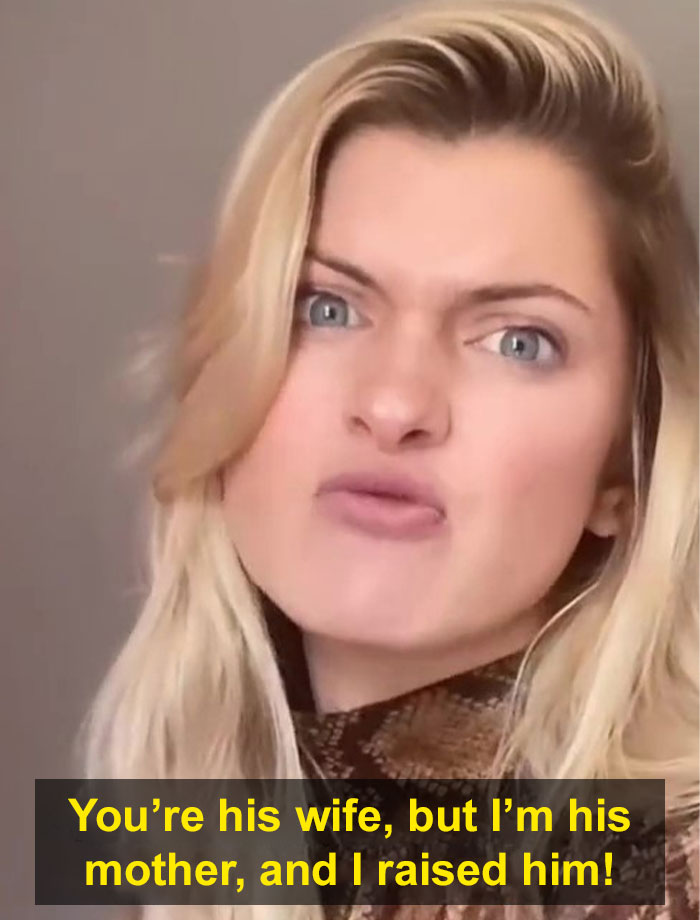
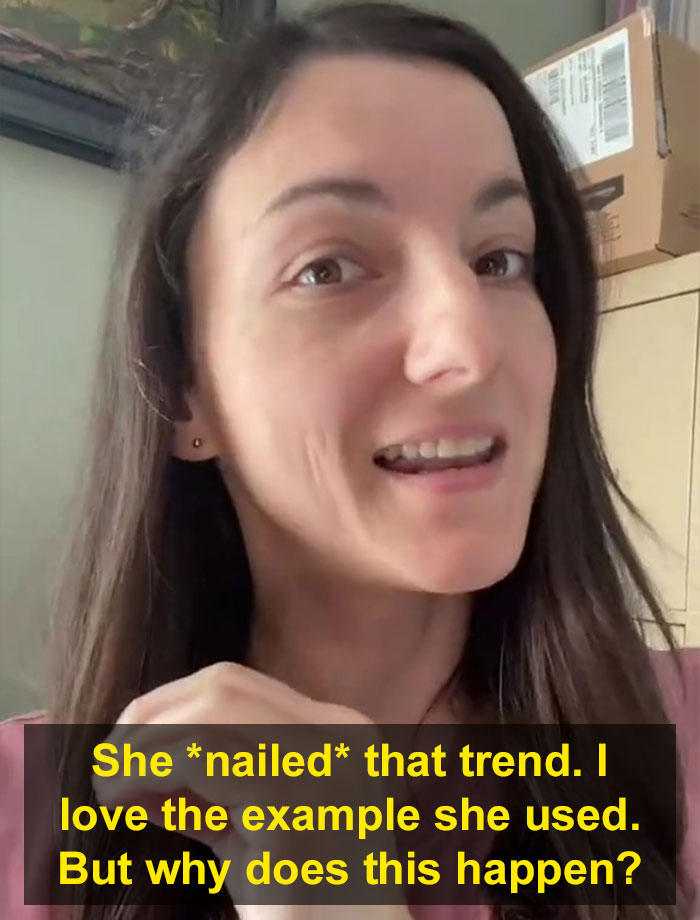
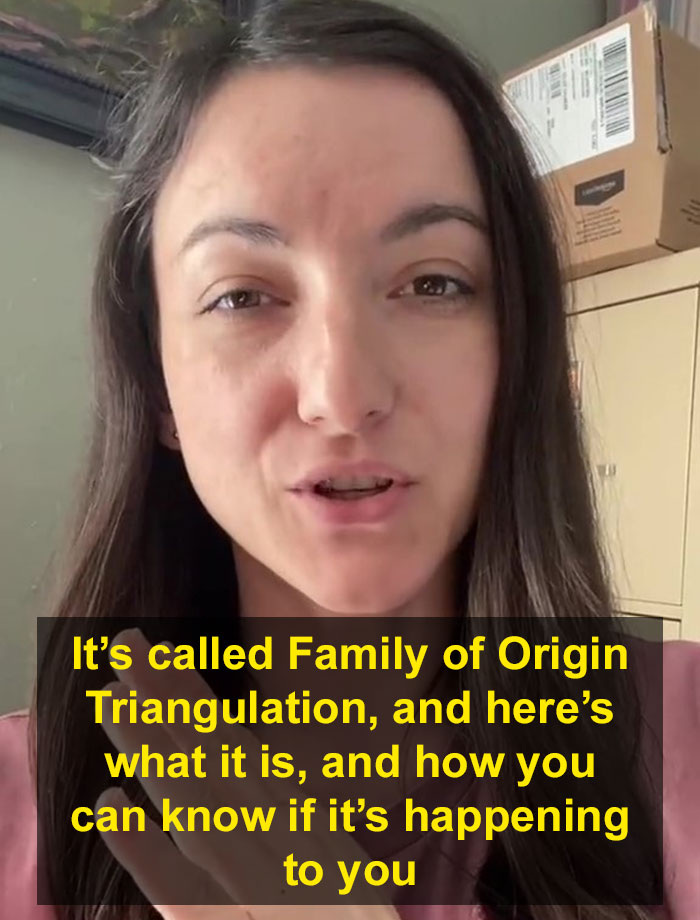
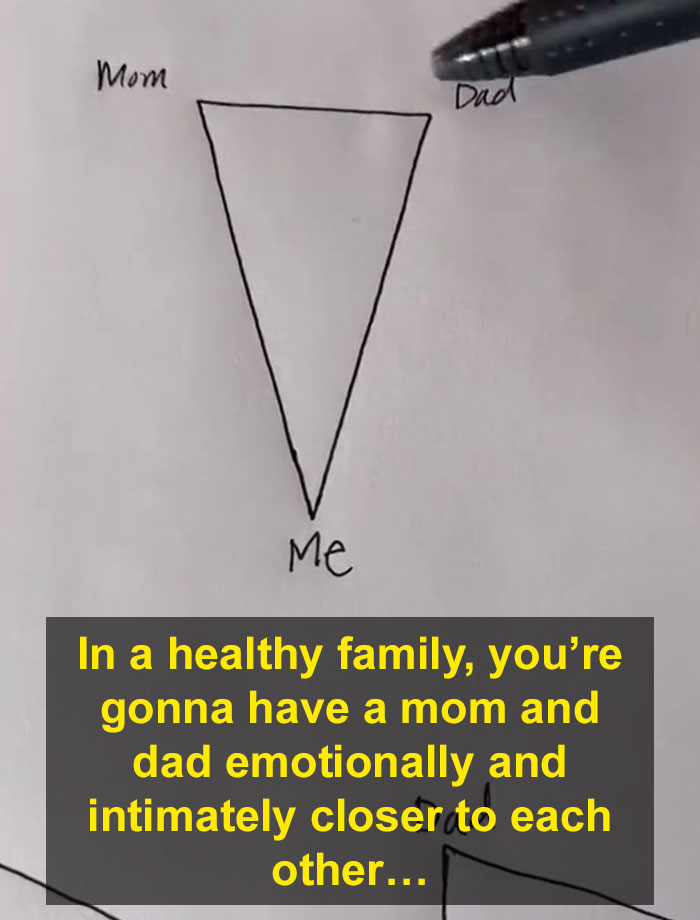
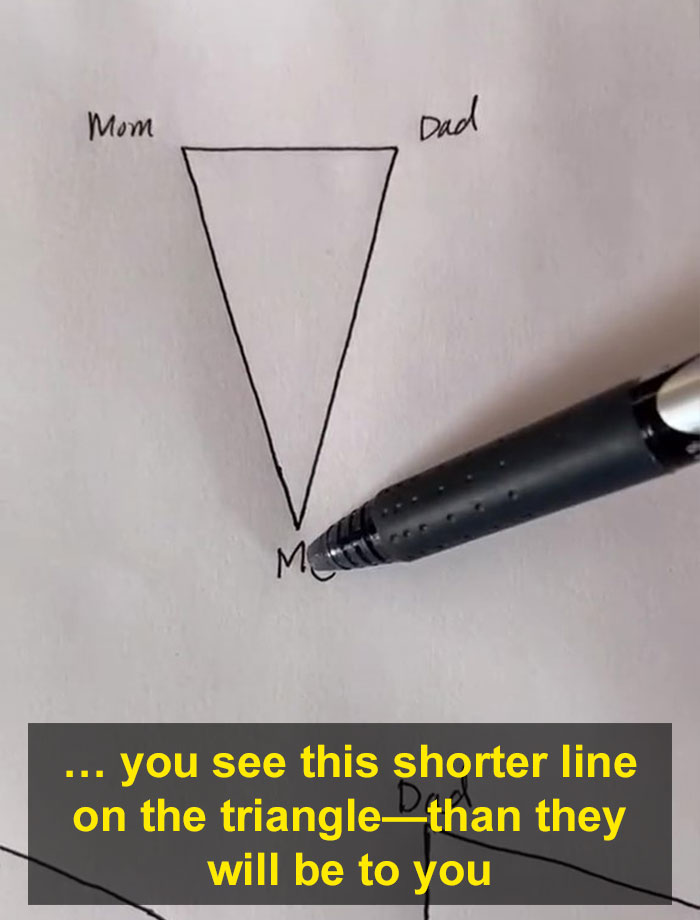
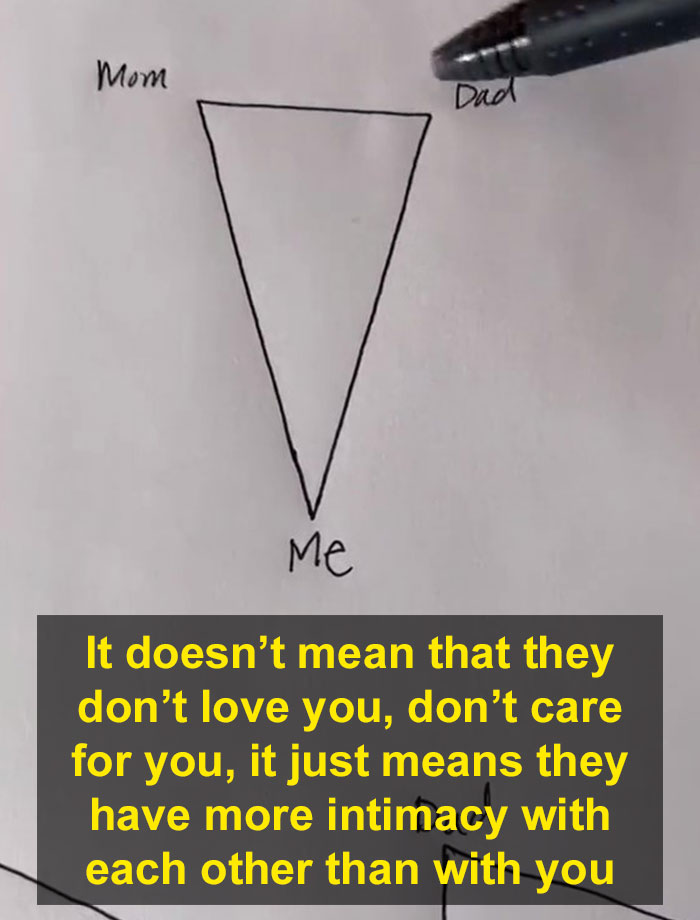
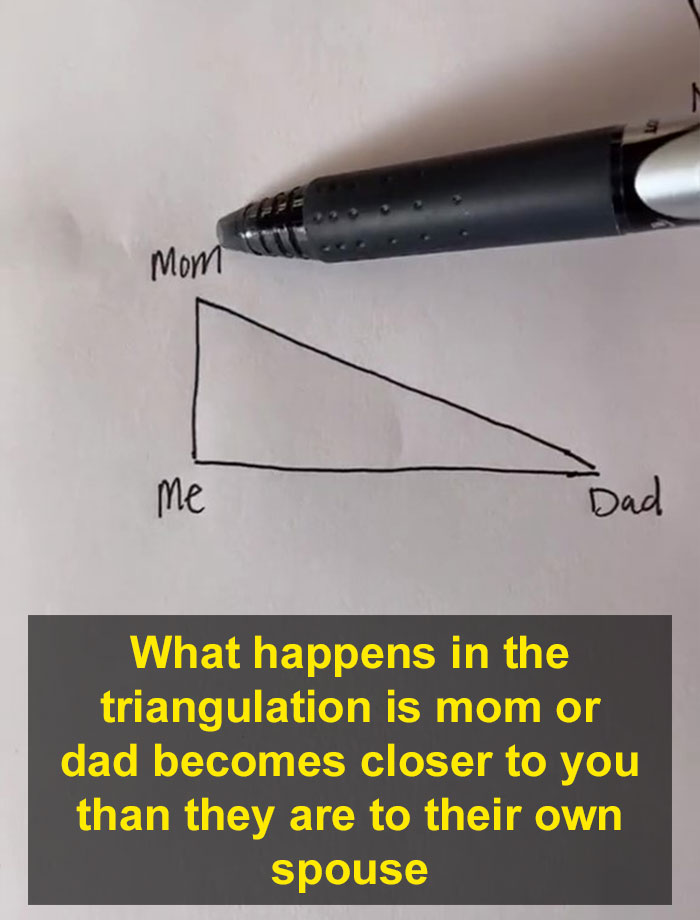
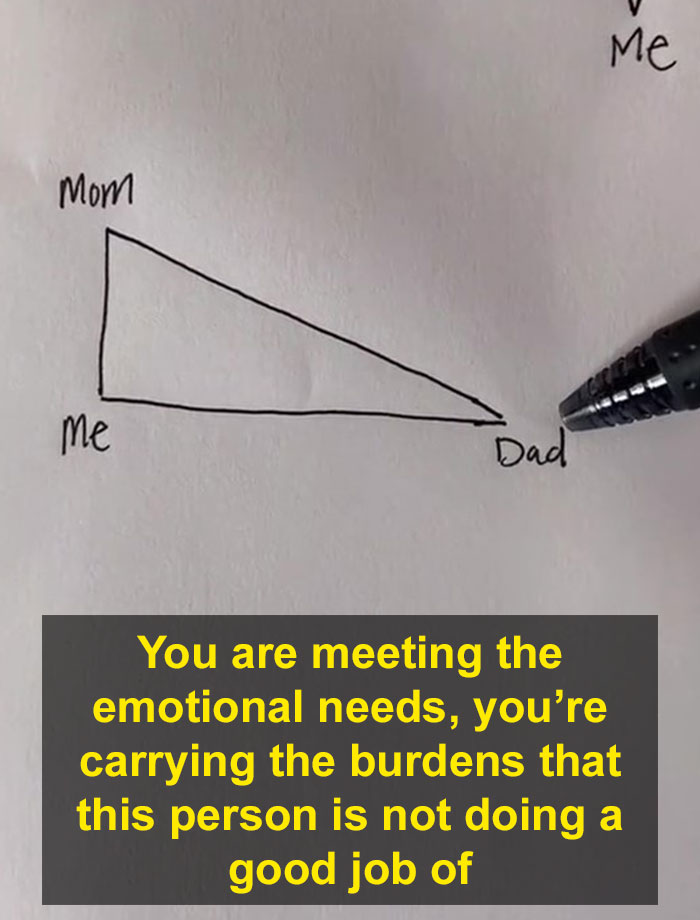
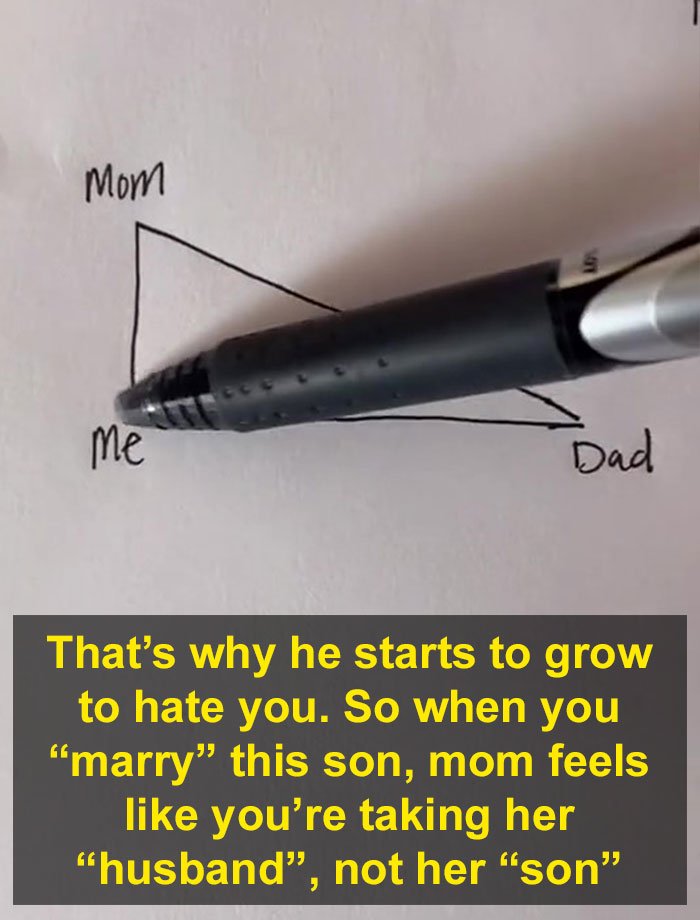
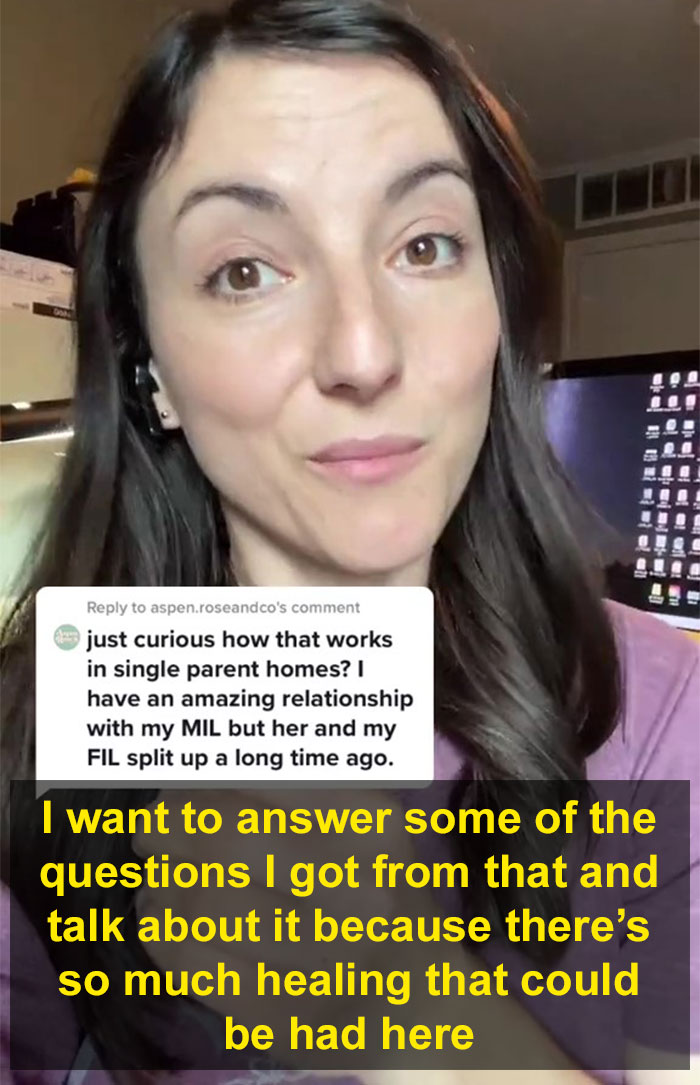
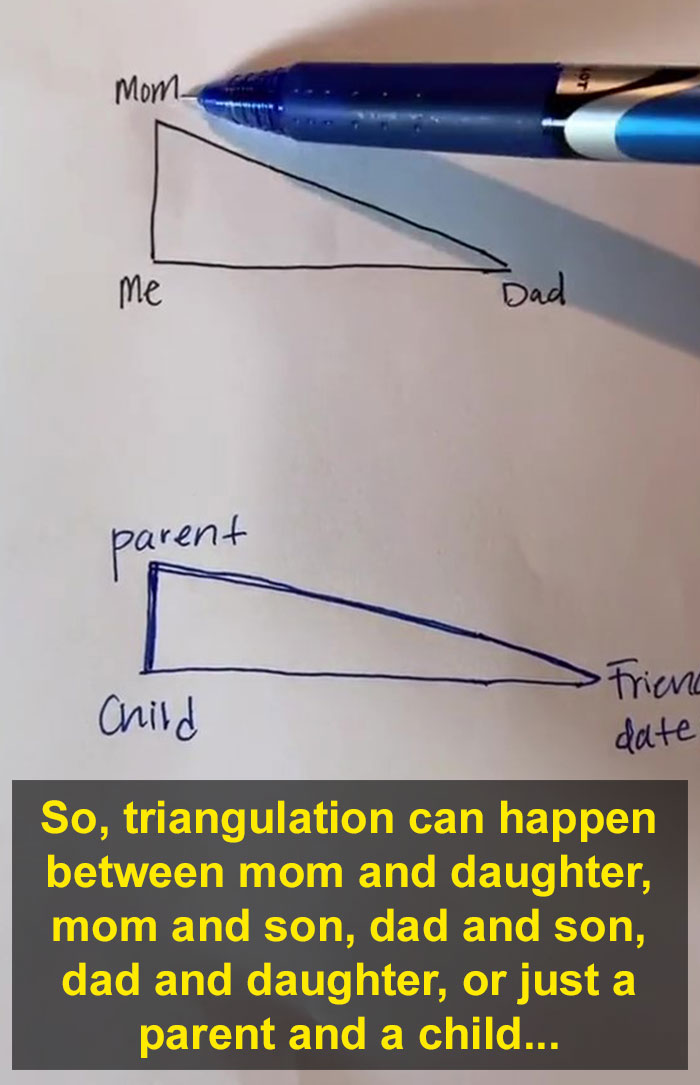
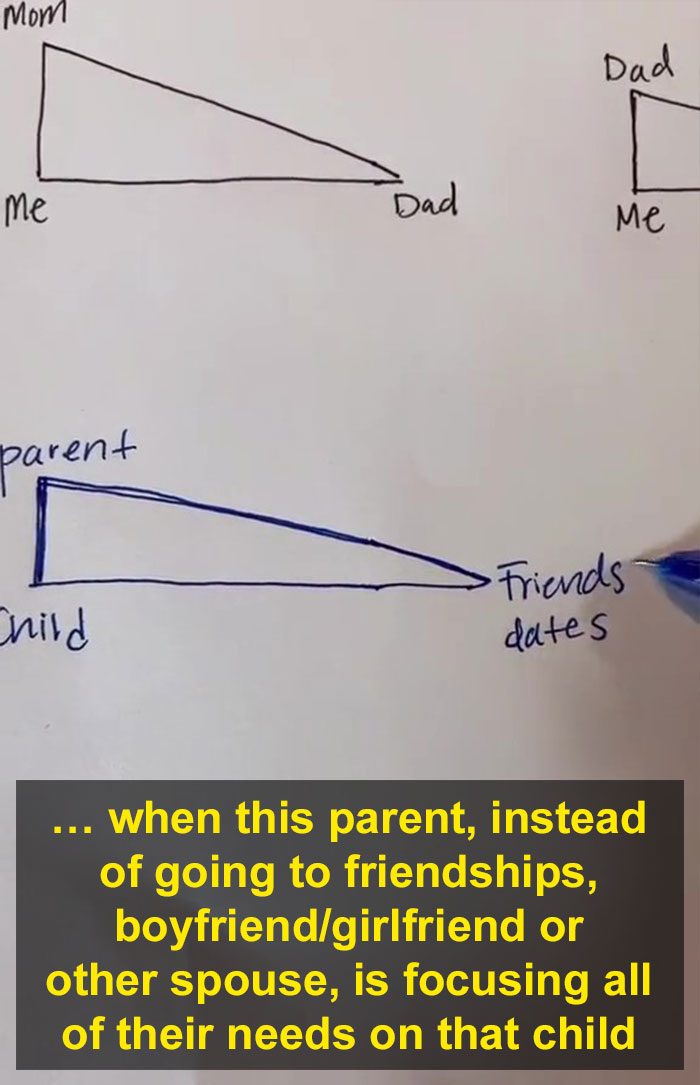
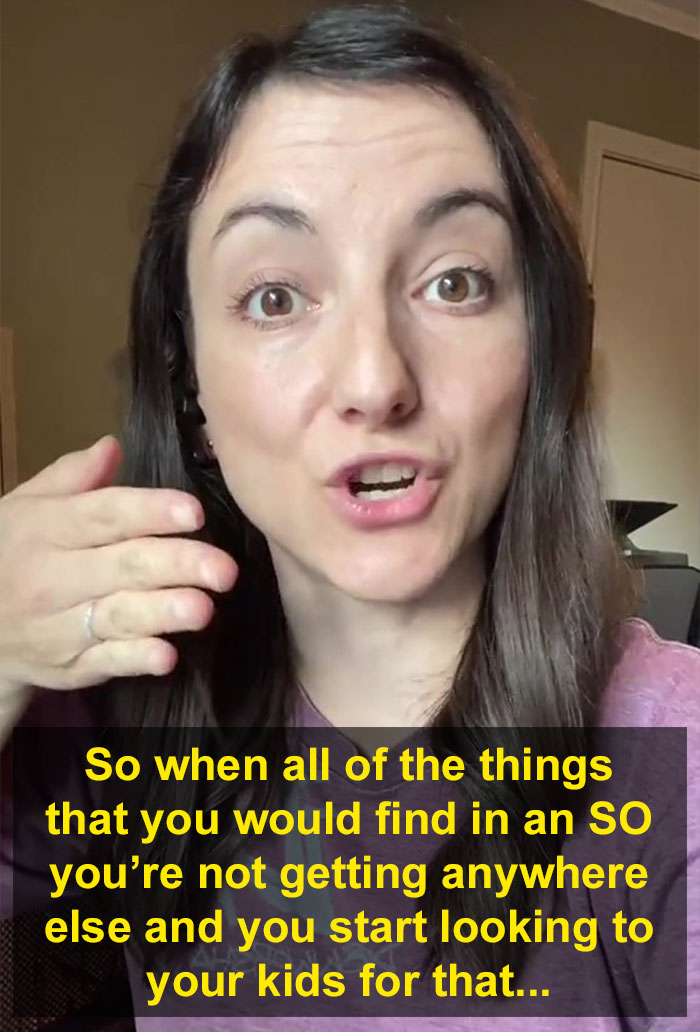
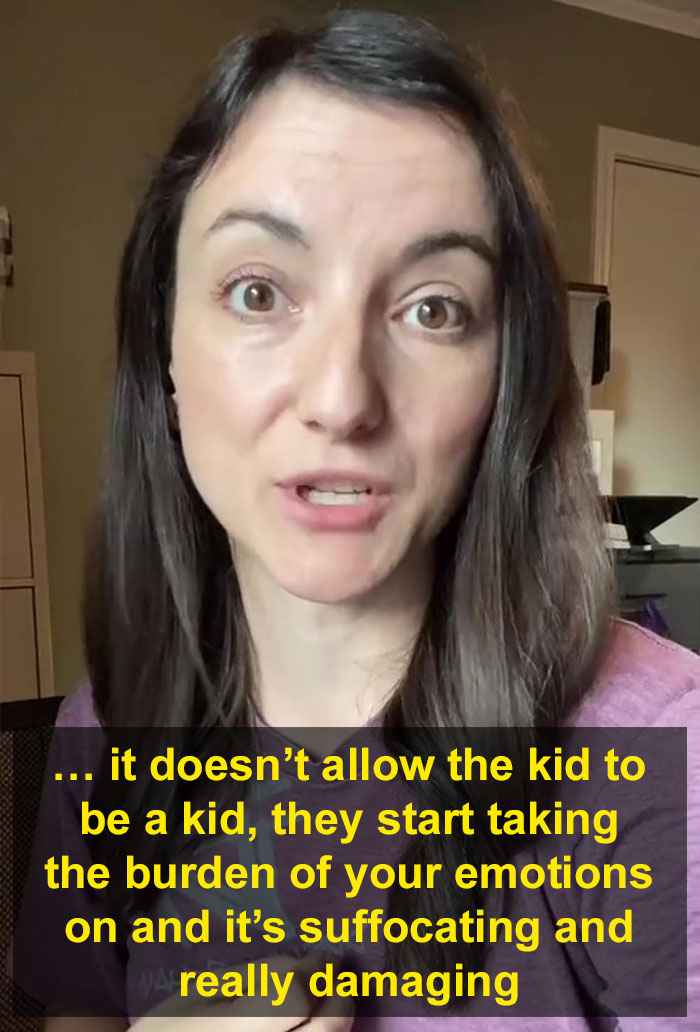











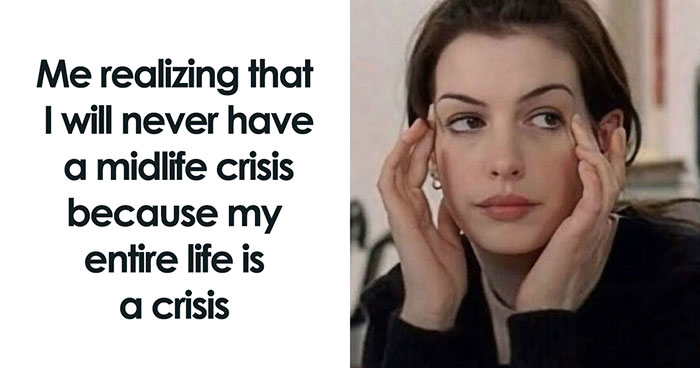



















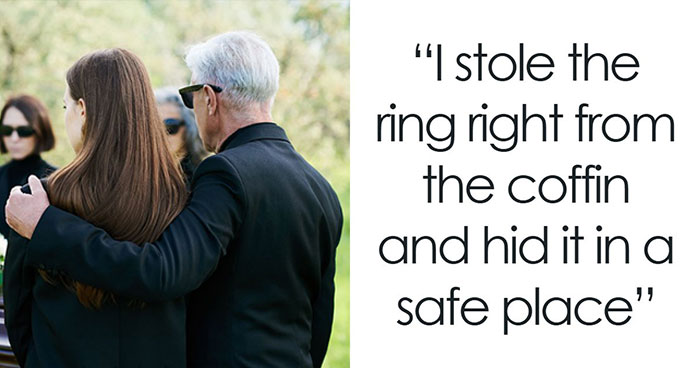
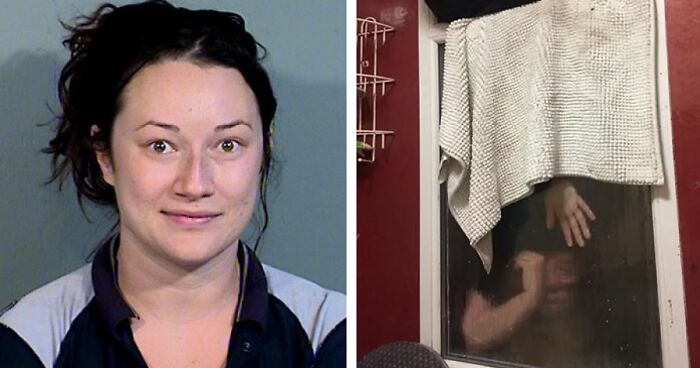










114
57